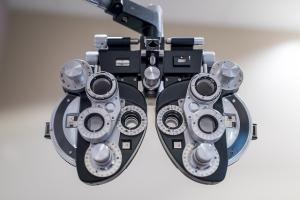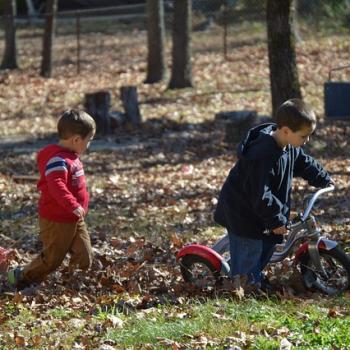
Adrienne walked out of the eye doctor’s office and sat next to me on the waiting room chairs.
“How did that go?” I asked.
“I don’t know,” she said, tapping her phone.
As I went into the office for my turn at the ophthalmoscope, I asked the the same question.
“She’s fine,” the doctor said pleasantly. “Perfect twenty twenty vision.”
I breathed a sigh of relief as he took my precious glasses, without which I can’t see more than five inches in front of my face. I take them off to read books or use the computer, with my characteristic hunching over and shoving the laptop too close to my eyes. Otherwise, without them, I can’t see a thing. There’s not only a corrective lens for astigmatism and severe nearsightedness in my glasses, but a prism for double vision as well. The doctor had to adjust the prism slightly for my new pair of glasses, because the exact angle at which my left eye fails to cooperate with my right is always changing.
When I got out of the office, I told Adrienne that she had perfect vision, the opposite of mine. She took this announcement with the characteristic adolescent nonchalance.
The school wanted Adrienne’s eyes checked to make sure they hadn’t missed anything. As I’ve told you before, she was recently diagnosed with dyslexia and severe dysgraphia. She is almost certainly autistic like me, but we’ll get the official diagnosis next month. She is a prodigy, in the 129th percentile, in the realm of auditory processing and retention, and her verbal communication skills test far above average as well. It’s only putting what she knows into letters on paper that is a problem. The school wanted to double check that she didn’t have any physical issues with her eyes, and now we know she doesn’t. The hardware of her organs works perfectly. The software connecting her ears, brain and mouth works twice as well as perfect. The software connecting eye, brain and hand is the only thing that doesn’t work as it should. If we lived in ancient Greece, she would be our Homer. Unfortunately, we live in Steubenville, so she needs an IEP when she starts middle school next month.
When I was a little girl, they didn’t usually diagnose autism unless you were non-verbal and nearly helpless– even then, girls couldn’t usually get diagnosed. Autism was, supposedly, something boys had. Of learning disabilities I think there were a few recognized, but not many. Conditions like ADHD were just being discovered– again, only in boys, and only with the most embarrassing caricatures of symptoms. The treatments for these conditions were bad. The main treatment for being atypical was humiliation. I still remember the boy at Saint Michael’s who was punished for making a Bronx cheer by being forced to sit in front of the whole class and make Bronx cheers for 20 minutes straight. I was made to sit at the front of the classroom away from the other children so the teacher could watch me and snatch away anything I tried to play with with my hands, because stimming was called “fidgeting” and it was against the rules. Everything that helped me was against the rules. I had to keep still when I can only learn and think if I’m in motion. I had to stay in the noisy classroom and the echoing cafeteria when I desperately wanted to go somewhere quiet and fidget and read interesting books. I got terribly nervous in crowds of other students. I would panic and burst into tears at an alarming rate.
And, of course, if the teacher didn’t humiliate me, my peers would. Over at Our Lady of Peace where I went to school next, I was tormented by bullies.
All I wanted was to be normal, but I couldn’t. All people around me wanted was for me to be normal, but it was impossible.
The only thing that ever worked for me was homeschooling. It was my salvation. I’ve homeschooled Adrienne from preschool all the way through the fifth grade, and now I’m done. I can’t teach middle school math or natural science. I know how to BE a neuroatypical person, but I don’t have the skills to educate one beyond this level. Adrienne wants to make some new friends and we don’t have friends among the local Catholics. We’re trying something new.
The school psychologist for Adrienne’s new middle school assured me over and over that they don’t humiliate for punishments anymore. There are measures in place to address bullies; bullying is no longer considered a rite of passage. I hope she’s right. There’s no way of knowing until we see how it goes.
We’ll find out for sure in about five weeks.
I have never been a typical person in any way, so I don’t know how it’s supposed to feel when your daughter is found to be atypical as well.
It just feels like Adrienne. Now some of Adrienne’s quirks have names– and, looking back, many of mine do too.
It feels like me, trying something new, not knowing if it will work. Wondering if Adrienne will ever forgive me if it doesn’t. Wondering if it will work perfectly, and Adrienne will hate me because she went this long without a diagnosis and an IEP at a regular school.
It feels like when I wake up and can’t find my glasses, and can’t see five inches in front of my face. I’ll find them soon and be able to get my bearings.
Once, when I was being particularly impossible about something or other, Adrienne gave me a withering look and said “What is your opinion of NORMAL?”
“Normal?” I said. “I don’t know. What’s your opinion of normal?”
“It doesn’t exist,” she assured me. “It’s just something people wish they were.”
Adrienne sees things much more clearly than I do.
I wish I’d seen things Adrienne’s way a long time ago.
Mary Pezzulo is the author of Meditations on the Way of the Cross, The Sorrows and Joys of Mary, and Stumbling into Grace: How We Meet God in Tiny Works of Mercy.













